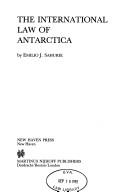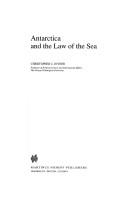| Listing 1 - 6 of 6 |
Sort by
|
Article
Year: 1992
Abstract | Keywords | Export | Availability | Bookmark
 Loading...
Loading...Choose an application
- Reference Manager
- EndNote
- RefWorks (Direct export to RefWorks)
Bear. --- Odour. --- Polar bear. --- Polar bears. --- Smell. --- Stereotypies. --- Stereotypy. --- Stimuli. --- Test. --- Walking.
Book
ISBN: 1857010078 Year: 1992 Publisher: Cambridge Grotius publ.
Abstract | Keywords | Export | Availability | Bookmark
 Loading...
Loading...Choose an application
- Reference Manager
- EndNote
- RefWorks (Direct export to RefWorks)
341.228 --- Antarctic Treaty system --- Poolgebieden --- Antarctic Regions --- Antarctica --- -Antarctic regions --- Polar regions --- International status. --- International status --- -International status. --- 341.228 Poolgebieden --- -Polar regions --- Antarctic regions

ISBN: 0792310373 9780792310372 Year: 1992 Volume: 6 Publisher: Antwerpen : Kluwer,
Abstract | Keywords | Export | Availability | Bookmark
 Loading...
Loading...Choose an application
- Reference Manager
- EndNote
- RefWorks (Direct export to RefWorks)
Antarctic Treaty --- Antarctica --- International status --- 341.228 --- Poolgebieden --- -Antarctic regions --- Polar regions --- -International status --- 341.228 Poolgebieden --- International status. --- Antarctica - International status
Book
ISBN: 3805554109 Year: 1992 Volume: 33 Publisher: Basel New York Sydney Karger
Abstract | Keywords | Export | Availability | Bookmark
 Loading...
Loading...Choose an application
- Reference Manager
- EndNote
- RefWorks (Direct export to RefWorks)
Circumpolaire geneeskunde --- Circumpolar health --- Circumpolar medicine --- Cold weather medicine --- Medecine circumpolaire --- Medicine [Circumpolar ] --- Medicine [Polar ] --- Polar medicine --- Cold Climate --- Skiing. --- -#SMV:geneeskunde --- #SMV:ski --- #SMV:712400 --- Low temperatures --- Medicine, Circumpolar --- Medicine, Polar --- Snow Skiing --- Snowboarding --- Skiing, Snow --- Skiings, Snow --- Snow Skiings --- Adaptation, Physiologic --- Adaptations, Physiologic --- Adaptations, Physiological --- Physiological Adaptation --- Physiologic Adaptation --- Physiologic Adaptations --- Physiological Adaptations --- Arctic Regions. --- Circumpolar medicine. --- Cold --- Adaptation, Physiological --- Skiing --- Stress, Psychological --- #SMV:fysiologie --- #SMV:geneeskunde --- 612:796 --- Medicine --- 612:796 Fysiologie van de sport --- Fysiologie van de sport --- Psychological Stress --- Stress, Psychologic --- Suffering --- Anguish --- Emotional Stress --- Life Stress --- Mental Suffering --- Life Stresses --- Psychologic Stress --- Psychological Stresses --- Stress, Emotional --- Stress, Life --- Stresses, Life --- Stresses, Psychological --- Suffering, Mental --- Adaptation, Biological --- Cold stress (Biology) --- Cryobiology --- Physiological effect --- adverse effects --- Adaptive Plasticity --- Phenotypic Plasticity --- Plasticity, Adaptive --- Plasticity, Phenotypic --- Stressor, Psychological --- Psychological Stressor --- Psychological Stressors --- Stressors, Psychological --- Sufferings --- Physiological effect. --- Cold - Physiological effect.

ISBN: 0792318234 9004481850 9780792318231 9789004481855 Year: 1992 Volume: 18 Publisher: Leiden; Boston : Brill | Nijhoff
Abstract | Keywords | Export | Availability | Bookmark
 Loading...
Loading...Choose an application
- Reference Manager
- EndNote
- RefWorks (Direct export to RefWorks)
Antarctica and the Southern Ocean cover one-tenth of the earth's surface. In a legal and environmental sense, Antarctica represents the geography of hope. It is the freshest and most pristine of regions, governed by a legal regime that offers Antarctica and its circumpolar water the unique possibility of becoming the world's first global wilderness preserve. But in today's age of resource scarcity, Antarctica still provokes much political, economic and legal debate. Over the past decade, international attention has increasingly focused on the legal status of the continent, the potential for hydrocarbon exploitation offshore, and opportunities for harvesting circumpolar living marine resources. In this fascinating treatment, Christopher C. Joyner undertakes the first serious examination of the intimate relationship between Antarctica and the law of the sea. Using Antarctica as a case study, Joyner probes large conceptual issues of ocean law and politics. He uses the intricate details of oceanography and law to unravel the dynamics of the Antarctic Treaty System. In doing so, he examines how the changing importance of Antarctic issues has affected the development of the law of the sea for the region, the ways in which states define their national interests, and the accommodation through various negotations that have contributed to the development of law for governing the Southern Ocean. While the study of law for the Antarctic is provocative in itself, this work goes much farther. The study critically analyzes the region's biogeography, the condition of sovereignty on the continent, the lawfulness of asserting jurisdictional zones offshore, and various legal implications for Antarctica's continental shelf, local island groups, circumpolar deep seabed, and the Southern Ocean's high seas. Moreover, the special legal efforts by the international community to protect the Antarctic seas from marine pollution and to conserve its living marine resources are comprehensively appraised. Thorough, authoritative, and objectively reasoned, Antarctica and the Law of the Sea provides an insightful assessment of how law can progressively develop for a resource-rich region of the world's ocean. As such, it should appeal to a broad range of international lawyers and social scientists who are interested in international relations, political economy, environmental politics, and the law of the sea.
Maritime law --- Droit maritime --- Antarctica --- Antarctique --- International status --- Statut international --- 341.225 --- Law, Maritime --- Marine law --- Merchant marine --- Merchant ships --- Navigation --- Navigation laws --- Shipping --- International law --- Commercial law --- Law of the sea --- Internationaal zeerecht. Mare liberum. Vrije zee. Zeeengten --- Law and legislation --- -Antarctic regions --- Polar regions --- -International status --- 341.225 Internationaal zeerecht. Mare liberum. Vrije zee. Zeeengten --- International status.
Book
ISBN: 0969588526 178694491X 1786949326 9781786949325 9780969588528 Year: 1992 Publisher: St. John's, Nfld. International Maritime Economic History Association
Abstract | Keywords | Export | Availability | Bookmark
 Loading...
Loading...Choose an application
- Reference Manager
- EndNote
- RefWorks (Direct export to RefWorks)
This volume aims to continue the expansion of maritime history beyond the narrow definition - 'the study of ships' - to include all people involved in seagoing activities. The volume consists of eleven articles exploring the people of Northern seas, spanning the seventeenth to nineteenth centuries and primarily focused on Europe. They were originally presented at a 1992 Finland conference of the Association for the History of the Northern Seas. The articles are broad in scope, and are collected here with the intention of stimulating further academic research into the lives and histories of the people of the Northern seas, which the editors, at the time of publication, consider under-examined. The articles are divided into three sections, the first examining livelihoods dependant on the ocean; seamen, fishermen. The second group examines maritime mercantile communities; merchants; shipowners; shipbrokers. The final group examines maritime culture, encompassing the navy and the coastguard.
World history --- anno 1700-1799 --- anno 1800-1899 --- Coasts --- History. --- Arctic regions --- North Pacific Ocean --- North Atlantic Ocean --- Europe, Northern --- Economic conditions. --- Social conditions. --- Coastal landforms --- Coastal zones --- Coastlines --- Landforms --- Seashore --- Northern Europe --- Atlantic Ocean --- Northern Pacific Ocean --- Pacific Ocean --- Arctic --- Arctic Ocean Region --- Arctic, The --- Far North --- The Arctic --- Polar regions
| Listing 1 - 6 of 6 |
Sort by
|

 Search
Search Feedback
Feedback About UniCat
About UniCat  Help
Help News
News